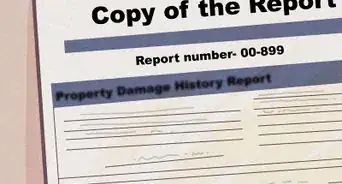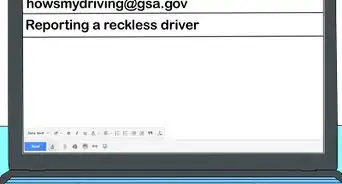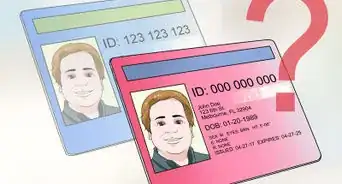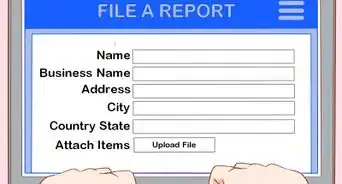This article was co-authored by Clinton M. Sandvick, JD, PhD. Clinton M. Sandvick worked as a civil litigator in California for over 7 years. He received his JD from the University of Wisconsin-Madison in 1998 and his PhD in American History from the University of Oregon in 2013.
There are 8 references cited in this article, which can be found at the bottom of the page.
This article has been viewed 142,209 times.
The U.S. Department of Housing and Urban Development (HUD) operates a housing voucher program under Section VIII of Title 24 of the Code of Federal Regulations.[1] This voucher program is commonly known as Section 8 assistance, and is designed to help low income, elderly, and disabled people afford decent, safe, and sanitary housing.[2] Unfortunately, some tenants commit fraud, which wastes government resources and can create unpleasant situations for landlords and neighbors. Once you have identified Section 8 fraud, it is easy to report it to the authorities.
Steps
Identifying Section 8 Fraud
-
1Determine if the person is committing financial fraud. If you suspect that your tenant or neighbor should be able to support their family with their income without Section 8 support, the police may be interested in investigating the situation.
- Section 8 assistance is given to those with low income to help them afford housing for themselves and their families.
- Sometimes, a tenant's income level will rise, but they will not report the increase in income in order to keep qualifying for Section 8 assistance. This is financial fraud.
- In other cases, a high-earning spouse may be living in the home but not listed on the lease.[3] If you sense a disconnect between the tenants' standard of living and the assistance they are receiving, keep an eye out for more concrete evidence, such as long-term "guests" who aren't on the lease.
-
2Identify unauthorized people permanently living in the home. There is usually nothing wrong with a tenant having guests overnight or even for an extended period of time. However, those receiving Section 8 assistance will sometimes take on roommates or sublet space to help pay the rent. They will keep these arrangements hidden because they no longer qualify for Section 8 assistance but want to keep receiving benefits.[4]
- If you see people who are not on the lease coming and going regularly from the home, it may warrant an investigation.
- A visitor becomes an "unauthorized guest" if they stay more than 15 consecutive days without approval from the Public Housing Authority (PHA), or more than 30 days in one twelve-month period.[5]
Advertisement -
3Be aware of other fraudulent arrangements. It is a violation for some convicted felons to reside in Section 8 housing, depending upon the type of offense and how long ago the offense was committed. Disqualifying offenses include violent crimes, sexual offenses, drug trafficking, and some types of fraud.[6] You might also encounter a Section 8 tenant who reports that there are more people living in the home than are actually present.
- For example, a Section 8 applicant might report to HUD that his children are living in the home and that he needs additional assistance to afford a home with more rooms, when in fact he is living alone in a larger home than he would otherwise be able to afford.[7]
- If you decide to investigate on your own, be careful not to cross the line into intrusiveness or harassment. Make note of or even discretely photograph people who regularly come an go from the property but should not be living there. Look out also for business transactions on the premises that could indicate drug-related activity.
Reporting Fraud
-
1Gather evidence and details. When you make your report, you will need to provide enough information to convince the investigating agency that fraud seems to be occurring, and enough detail to indicate who and where to investigate. If your information is too vague or unsubstantiated, the investigating agency might choose not to take any action.[8] Be prepared to provide as much of the following as you can:
- The violator's name;
- The violator's address;
- How you know the violator is receiving Section 8 assistance;
- Why you believe the violator does not qualify for Section 8 assistance;
- What benefit the violator is receiving through his or her fraud;
- What actions or scheme the violator is using to commit fraud;[9]
- Descriptions of people living at the address, or photographs, if you have them; and
- Any other documentation that supports your claim.
-
2Decide whether or not to remain anonymous. You generally have the option to make an anonymous fraud report.[10] However, if you remain anonymous, the investigator will not be able to contact you again for any additional information or details.
- Whether or not you remain anonymous, you are not entitled to receive follow-up information about the investigation from the investigating agency.[11]
-
3Report fraud to the Department of Housing and Urban Development. HUD has an Office of Inspector General (OIG), which is the law enforcement arm of the department. OIG investigates fraud, waste, and abuse in the Section 8 program. You can visit, call, email, or fax to report fraud. Note that OIG may choose to let your local PHA investigate your report. You can make your report by doing one of the following:
- Visit an OIG regional office. You can find address and contact information for each location at: https://www.hudoig.gov/about/where-were-located.
- Email your report to: hotline@hudoig.gov.[12]
- Write to: HUD Inspector General Hotline (GFI), 451 7th Street, SW, Washington, DC 20410.[13]
- Contact OIG via fax at: 202-708-4829.[14]
- Submit an intake form. Fill out the one-page form and mail or fax it to the address or number at the bottom of the page.
-
4Locate your local Public Housing Authority. You may choose to report instances of fraud to your local PHA instead of reporting to HUD. To locate your local PHA, use the database provided by HUD at http://portal.hud.gov/hudportal/HUD?src=/program_offices/public_indian_housing/pha/contacts.
- Select your state, which will direct you a list of city and county PHAs with addresses and contact information.
-
5Report fraud to your local PHA. Each PHA has its own system for processing fraud reports. For example, the Housing Authority of New Orleans operates a webpage at https://www.hano.org/Tenants/IncidentReport# where you can find a hotline number or fill in an online incident report form. Other PHAs may redirect you to a third party. For instance, the Housing Authority for the City of Los Angeles accepts online reports through [mysafeworkplace.com].
References
- ↑ https://www.law.cornell.edu/cfr/text/24/chapter-VIII
- ↑ http://portal.hud.gov/hudportal/HUD?src=/program_offices/public_indian_housing/programs/hcv/about/fact_sheet
- ↑ http://www.fraudoftheday.com/2012/11/09/how-many-people-live-at-your-house
- ↑ http://www.biggerpockets.com/renewsblog/2012/08/25/section-8-fraud-violations-vouchers-interview/
- ↑ http://www.section8facts.com/2013/11/29/faq-2-what-is-the-distinction-between-a-visitor-and-an-unauthorized-guest/
- ↑ http://felonopportunities.com/housing-assistance-for-felons/
- ↑ http://www.biggerpockets.com/renewsblog/2012/08/25/section-8-fraud-violations-vouchers-interview/
- ↑ https://www.hudoig.gov/hotline/report-fraud
- ↑ https://www.hudoig.gov/hotline/report-fraud
About This Article
If someone is claiming section 8 support while making a good income or subletting a room in their house, they may be committing fraud. Your local Department of Housing and Urban Development office will have an Office of Inspector General that deals with fraud reports. You can contact them by email, letter, or an in-person visit. Tell them the name and address of the person you suspect of section 8 fraud and tell them why you believe this. You can choose to report the fraud anonymously if you’re worried about the person finding out. Alternatively, contact your local Public Housing Authority, who can either deal with your report or direct you to a third party who can. For more tips from our Legal co-author, including how to locate your nearest Public Housing Authority, read on.




































































